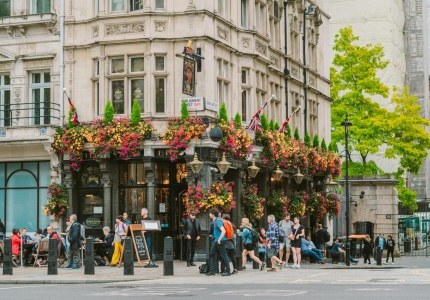Take a moment to reflect. What do you live for? What is the reason you get out of bed in the morning? What lights your fire and propels you into action? Simply speaking, that is your ikigai.
Ikigai is a Japanese concept originating from the culture of Okinawa. The word itself is composed of two words: “iki” (meaning “life”) and “kai” (meaning “effect,” “result” or “worth”), yielding the definition “the reason for living.” It is very similar to the Western concept of raison d'être. Researchers have been baffled by the longevity of the people of Okinawa, eventually coming to the conclusion after several long-term studies that those with an ikigai generally have a lower risk of developing cardiovascular diseases and tend to live longer.
How can you find your ikigai?
To find your ikigai, simply answer the following four questions: (1) What do you love to do?, (2) What does the world need from you?, (3) What are you good at? and (4) What can you be paid for? Your ikigai lies at the intersection of all these.
At the meeting point between what you love to do and what you’re good at, you find your passion. Your mission lies in the convergence of what you love and what the world needs from you. If you can get paid for providing what the world needs from you, you find your vocation. If what you are good at overlaps with what you can get paid for, you discover your profession.
Finding those intersections between two categories is excellent, but merging three categories gets you closer to your ikigai. Nevertheless, if one of the four checkboxes remains unmarked, you may feel somewhat empty in a certain way. If you can converge what you love, what you’re good at and what you can get paid for, you may feel satisfaction but still be haunted by a subtle sense of uselessness. At the intersection between what you love, what you’re good at and what the world needs from you, you find fulfillment but no wealth. If you love what you’re doing, you know the world needs your skills and you are getting paid for doing that, you may feel excitement but uncertainty knowing that perhaps you’re not very good at what you do. And merging what you’re good at with what the world needs and what you can be paid for yields a feeling of comfort but emptiness. Full fulfillment, your ikigai, is found when the answer to all four questions is the same.
The 10 principles of ikigai
This may sound like an elusive holy grail, but it is a lot simpler to attain than you might think. Yes, sometimes, ikigai manifests in big ways like finding your life’s calling, but, more often, it is found in the simple blessings of daily life and it is always evolving. Today, your ikigai might be baking cookies for your daughter’s bake sale. After all, look at the people of Okinawa who follow this principle; they live humble lives, caring for their crops, participating in community activities, forming strong friendships and eating healthfully. This may not sound very ambitious or fulfilling to those of us who are caught in a competitive, rat-race culture, but it is in this simplicity that they find their ikigai. And you can too if you follow these 10 principles:
- Stay active
Never stop learning or trying new things. It is in this exploration that you find your youthful sense of wonder and discover interests and abilities you never knew you had. The elderly people of Okinawa don’t retire; they keep doing activities that in the Western world is thought of as too grueling for those in their old age. But age is in the mind. Is there something you loved doing that you set aside? Maybe you need to pick up that guitar or paintbrush again. Or perhaps you’ve always wanted to learn to dance but have always been too afraid. Take the plunge. Whatever you do, don’t stop moving.
- Find tranquility
This one is hard to follow in our fast-paced world, but make sure you take time out every day to slow down. Just five minutes every now and then can do wonders. This will look different for everyone. Maybe do a little bit of yoga while you have your morning tea. Or schedule a weekend getaway at AIRE Ancient Baths, where you can experience the deep relaxation that comes from the ancient Greco-Roman tradition of thermal baths. Get a massage, enjoy a facial, take a dip in a variety of baths and gaze at the candle-lit view of AIRE’s magical, restored, historical buildings. Shed away everything that doesn’t serve you, practice self-care and reconnect with your soul to discover your ikigai.
- Don’t overeat
Adequate nourishment is key. If our bodies are off-balance, our minds will be as well. The people of Okinawa follow the 80/20 rule when it comes to nutrition, eating only until they are 80% full. This has extraordinary effects on the mind, cultivating self-awareness and preventing the mindlessness that we often fall prey to when we’re just plowing through life. If you’re in touch with your bodily rhythms, it’s only a matter of time before you can tap into your heart and find your ikigai.
- Surround yourself with good friends
As the Okinawa study revealed, strong community is key. Take time to cultivate your friendships, steering clear of superficial conversations and seeking to strengthen deep bonds with those who truly have your best interest at heart and who are there to support you unconditionally.
- Get in shape
It is no secret that exercise boosts mood, producing endorphins and dopamine. Set small goals for yourself, even if it means simply taking a 10-minute walk during your lunch break or taking the stairs rather than the elevator. Accomplishing little goals creates a sense of satisfaction and empowerment that can help you find your ikigai.
- Smile
Smiling draws people to us and strengthens human bonds while improving our outlook on life. Even when you don’t feel like smiling, doing so can trigger chemical changes in the brain that can boost your mood.
- Reconnect with nature
Nature is profoundly healing, drawing us closer to our soul. Take some time to sit under a tree in the park. Or book a mini vacation at AIRE Ancient Baths Vallromanes, located in a restored country house right next to the mountains of Serralada Litoral in northeastern Spain. Not only will you be able to reap the relaxation benefits of thermal baths, you will also be able to sit back and enjoy the peace of the natural landscape that surrounds you. This may be just what you need to reconnect with your heart and discover your ikigai.
- Give thanks
Take time everyday to reflect on what you’re thankful for. Even in the darkest moments, you’ll realize that you are surrounded by blessings. Take a moment to bask in the golden sunlight. Meet up with a friend and tell her how thankful you are for what she brings to your life. Make a list of everything that made you laugh today. Eventually, you’ll find that these little things are actually huge.
- Live in the moment
Too often, we get caught in the sorrows of our past and our fears of the future, going into autopilot and forgetting to live the moment. Stop for a second and breathe. Is what your currently living at this very moment all that bad? Most often, you’ll find a sense of complacency in the present moment. By practicing mindfulness and living in the here-and-now, we calm the mental chatter that blinds us to our ikigai.
- Follow your ikigai
Once you find a glimmer of your ikigai, follow it with all your heart. Take practical steps to make it a tangible reality in your life. This might mean putting down on paper the first few lines of that book you’ve been dreaming of writing. Or enrolling in a photography class. Or going for a run to train for that marathon. Whatever it is, once you find it, don’t let it slip away.



